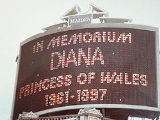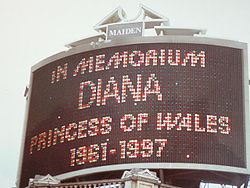
Mourning sickness
Encyclopedia
Mourning sickness is a collective
emotional condition of "recreational grieving" by individuals at the death of murder
victims or celebrities. Such celebrity deaths may be linked to hyper-attentive, intrusive and voyeuristic
media coverage, which has been dubbed grief porn.
 The history of mourning sickness in Great Britain
The history of mourning sickness in Great Britain
can be traced to the public reaction to the Dunblane massacre
that occurred in Scotland in 1996 when a lone assailant killed 16 schoolchildren and one adult at the Dunblane Primary School. The tragedy
prompted a public reaction that brought a flood of flowers and sympathy cards from across Great Britain. A worldwide exhibit of mourning sickness followed the death of Diana, Princess of Wales
in 1997 when the Princess was killed in a car crash in Paris
. Almost immediately following word of her death, makeshift memorials to Diana began to pop up, most notably at her residence at Kensington Palace
. The memorials became a gathering place for public weeping and for people to bring flowers. Ian Jack, writing in The Guardian, argued that this recreational grieving changed a simple observer of a news story into an active participant, changing people "from audience to actor".
Similar displays of public grief occurred following the death of Linda McCartney
, the murder of BBC
journalist Jill Dando
, the murder of eight-year-old Sarah Payne, and the murder of two Cambridgeshire
schoolgirls from Soham
.
 The advent of the Internet
The advent of the Internet
added a new development in public mourning sickness that was displayed following the murder of American teenager Anna Svidersky
in Vancouver, Washington
. Svidersky was murdered while working at a McDonald's
restaurant by schizophrenic
sex offender
David Barton Sullivan. News of her death quickly spread worldwide, initially through the website MySpace
, where she had a personal page, and then through other similar sites. This created an effect of mass grief and mourning for her around the world mostly from people who had previously known nothing about her.
In Britain, The Guardian
newspaper compared the widespread expression of grief by strangers to that seen after the death of Princess Diana. The paper cited the 2004 Civitas think-tank, which described such grief as "mourning sickness", related to people's own emotional needs, rather than any real rapport with the deceased.
journalist Patrick West
said in his booklet Conspicuous Compassion that "mourning sickness is a religion for the lonely crowd that no longer subscribes to orthodox churches. Its flowers and teddies are its rites, its collective minute's silences its liturgy and mass." In 2005, Journalist Rosie Boycott
narrated an episode of Five's Don't Get Me Started about mourning sickness .
, neologistic expression usually used to describe the behavior of the news media in the wake of a tragedy. It is distinctly different from Schadenfreude
in that it describes a forced or artificial commiseration in response to unfortunate events, whereas the latter refers to a joy at the misfortune of others. Commentators like Charlie Brooker have noted that the distinction can be blurred by the 24-hour news cycle
and its need to produce news stories.
Robert Yates, assistant editor for The Observer
, described some media coverage of deaths as producing "Gratification derived from a tenuous connection to the misfortunes of others; the gratuitous indulgence of tangential association with tragedy; getting off on really bad news". Yates was remarking on the phenomenon he first noticed following the death of Princess Diana
and the media frenzy that occurred afterwards. He reportedly observed an increase in activity during times of national mourning and international disaster, and commented dryly that it primarily affects people working in media.
Carol Sarler, writing as a guest columnist for The Times
, noted that "this new and peculiar pornography of grief" is sometimes called a 'tribute', "the cruder truth is that ersatz grief is now the new pornography; like the worst of hard-core, it is stimulus by proxy, voyeuristically piggy-backing upon that which might otherwise be deemed personal and private, for no better reason than frisson and the quickening of an otherwise jaded pulse.
The Times online's Daniel Finkelstein
, called such coverage "a rather tasteless fascination with other people's disasters and a sentimentalism that is out of place". However, he did not think this explained people's fascination with all deaths; using the example of the Madeleine McCann
a four-year-old child who went missing while on holiday with her parents, Finkelstein theorized that "we don't follow the McCann case because we are grief junkies. Most of us follow it because we fancy ourselves as (Inspector) Morse
.
Collective
A collective is a group of entities that share or are motivated by at least one common issue or interest, or work together on a specific project to achieve a common objective...
emotional condition of "recreational grieving" by individuals at the death of murder
Murder
Murder is the unlawful killing, with malice aforethought, of another human being, and generally this state of mind distinguishes murder from other forms of unlawful homicide...
victims or celebrities. Such celebrity deaths may be linked to hyper-attentive, intrusive and voyeuristic
Voyeurism
In clinical psychology, voyeurism is the sexual interest in or practice of spying on people engaged in intimate behaviors, such as undressing, sexual activity, or other activity usually considered to be of a private nature....
media coverage, which has been dubbed grief porn.
History

Great Britain
Great Britain or Britain is an island situated to the northwest of Continental Europe. It is the ninth largest island in the world, and the largest European island, as well as the largest of the British Isles...
can be traced to the public reaction to the Dunblane massacre
Dunblane massacre
The Dunblane massacre was a multiple murder-suicide which occurred at Dunblane Primary School in the Scottish town of Dunblane on 13 March 1996. Sixteen children and one adult were killed by Thomas Hamilton before he committed suicide.-Timeline of events:...
that occurred in Scotland in 1996 when a lone assailant killed 16 schoolchildren and one adult at the Dunblane Primary School. The tragedy
Tragedy (event)
A tragedy is an event in which one or more losses, usually of human life, occurs that is viewed as mournful. Such an event is said to be tragic....
prompted a public reaction that brought a flood of flowers and sympathy cards from across Great Britain. A worldwide exhibit of mourning sickness followed the death of Diana, Princess of Wales
Death of Diana, Princess of Wales
On 31 August 1997, Diana, Princess of Wales, died as a result of injuries sustained in a car accident in the Pont de l'Alma road tunnel in Paris, France. Her companion, Dodi Fayed, and the driver of the Mercedes-Benz W140, Henri Paul, were pronounced dead at the scene of the accident. Fayed's...
in 1997 when the Princess was killed in a car crash in Paris
Paris
Paris is the capital and largest city in France, situated on the river Seine, in northern France, at the heart of the Île-de-France region...
. Almost immediately following word of her death, makeshift memorials to Diana began to pop up, most notably at her residence at Kensington Palace
Kensington Palace
Kensington Palace is a royal residence set in Kensington Gardens in the Royal Borough of Kensington and Chelsea in London, England. It has been a residence of the British Royal Family since the 17th century and is the official London residence of the Duke and Duchess of Cambridge, the Duke and...
. The memorials became a gathering place for public weeping and for people to bring flowers. Ian Jack, writing in The Guardian, argued that this recreational grieving changed a simple observer of a news story into an active participant, changing people "from audience to actor".
Similar displays of public grief occurred following the death of Linda McCartney
Linda McCartney
Linda Louise McCartney, Lady McCartney was an American photographer, musician and animal rights activist. Her father and mother were Lee Eastman and Louise Sara Lindner Eastman....
, the murder of BBC
BBC
The British Broadcasting Corporation is a British public service broadcaster. Its headquarters is at Broadcasting House in the City of Westminster, London. It is the largest broadcaster in the world, with about 23,000 staff...
journalist Jill Dando
Jill Dando
Jill Wendy Dando was an English journalist, television presenter and newsreader who worked for the BBC for 14 years. She was murdered by gunshot outside her home in Fulham, West London; her killer has never been identified....
, the murder of eight-year-old Sarah Payne, and the murder of two Cambridgeshire
Cambridgeshire
Cambridgeshire is a county in England, bordering Lincolnshire to the north, Norfolk to the northeast, Suffolk to the east, Essex and Hertfordshire to the south, and Bedfordshire and Northamptonshire to the west...
schoolgirls from Soham
Soham murders
The Soham murders was an English murder case in 2002 of two 10-year-old girls in the village of Soham, Cambridgeshire.The victims were Holly Marie Wells and Jessica Aimee Chapman...
.
Anna Svidersky

Internet
The Internet is a global system of interconnected computer networks that use the standard Internet protocol suite to serve billions of users worldwide...
added a new development in public mourning sickness that was displayed following the murder of American teenager Anna Svidersky
Anna Svidersky
Anna Esther Svidersky was a teenager who lived in the U.S. city of Vancouver, Washington, and was murdered while working in a McDonald's restaurant, by David Barton Sullivan, a twice-convicted schizophrenic sex offender...
in Vancouver, Washington
Vancouver, Washington
Vancouver is a city on the north bank of the Columbia River in the U.S. state of Washington. Incorporated in 1857, it is the fourth largest city in the state with a 2010 census population of 161,791 as of April 1, 2010...
. Svidersky was murdered while working at a McDonald's
McDonald's
McDonald's Corporation is the world's largest chain of hamburger fast food restaurants, serving around 64 million customers daily in 119 countries. Headquartered in the United States, the company began in 1940 as a barbecue restaurant operated by the eponymous Richard and Maurice McDonald; in 1948...
restaurant by schizophrenic
Schizophrenia
Schizophrenia is a mental disorder characterized by a disintegration of thought processes and of emotional responsiveness. It most commonly manifests itself as auditory hallucinations, paranoid or bizarre delusions, or disorganized speech and thinking, and it is accompanied by significant social...
sex offender
Sex offender
A sex offender is a person who has committed a sex crime. What constitutes a sex crime differs by culture and by legal jurisdiction. Most jurisdictions compile their laws into sections such as traffic, assault, sexual, etc. The majority of convicted sex offenders have convictions for crimes of a...
David Barton Sullivan. News of her death quickly spread worldwide, initially through the website MySpace
Myspace
Myspace is a social networking service owned by Specific Media LLC and pop star Justin Timberlake. Myspace launched in August 2003 and is headquartered in Beverly Hills, California. In August 2011, Myspace had 33.1 million unique U.S. visitors....
, where she had a personal page, and then through other similar sites. This created an effect of mass grief and mourning for her around the world mostly from people who had previously known nothing about her.
In Britain, The Guardian
The Guardian
The Guardian, formerly known as The Manchester Guardian , is a British national daily newspaper in the Berliner format...
newspaper compared the widespread expression of grief by strangers to that seen after the death of Princess Diana. The paper cited the 2004 Civitas think-tank, which described such grief as "mourning sickness", related to people's own emotional needs, rather than any real rapport with the deceased.
Criticism
Some critics have described the public displays of mourning as "phony" and more for the benefit of the people grieving than for the victims, families or individuals that they are grieving for. The media plays a pivotal role in these displays, focusing attention on the public reaction to these events. TimesThe Times
The Times is a British daily national newspaper, first published in London in 1785 under the title The Daily Universal Register . The Times and its sister paper The Sunday Times are published by Times Newspapers Limited, a subsidiary since 1981 of News International...
journalist Patrick West
Patrick West
Dr. Patrick West is a freelance writer based in the UK and Ireland.Born in London in 1974, he graduated from Manchester University in 1997 with an MA in Cultural History...
said in his booklet Conspicuous Compassion that "mourning sickness is a religion for the lonely crowd that no longer subscribes to orthodox churches. Its flowers and teddies are its rites, its collective minute's silences its liturgy and mass." In 2005, Journalist Rosie Boycott
Rosie Boycott
Rosel Marie Boycott , better known as Rosie Boycott, is a British journalist and feminist.-Journalism career:Daughter of Major Charles Boycott and Betty Boycott née Le Sueur, Rosel Boycott was born in St Helier, Jersey and was educated at the independent Cheltenham Ladies' College and read...
narrated an episode of Five's Don't Get Me Started about mourning sickness .
Media "grief porn"
Grief porn is a pejorativePejorative
Pejoratives , including name slurs, are words or grammatical forms that connote negativity and express contempt or distaste. A term can be regarded as pejorative in some social groups but not in others, e.g., hacker is a term used for computer criminals as well as quick and clever computer experts...
, neologistic expression usually used to describe the behavior of the news media in the wake of a tragedy. It is distinctly different from Schadenfreude
Schadenfreude
Schadenfreude is pleasure derived from the misfortunes of others. This German word is used as a loanword in English and some other languages, and has been calqued in Danish and Norwegian as skadefryd and Swedish as skadeglädje....
in that it describes a forced or artificial commiseration in response to unfortunate events, whereas the latter refers to a joy at the misfortune of others. Commentators like Charlie Brooker have noted that the distinction can be blurred by the 24-hour news cycle
24-hour news cycle
The 24-hour news cycle arrived with the advent of television channels dedicated to news, and brought about a much faster pace of news production with increased demand for stories that can be presented as news, as opposed to the day-by-day pace of the news cycle of printed daily newspapers...
and its need to produce news stories.
Robert Yates, assistant editor for The Observer
The Observer
The Observer is a British newspaper, published on Sundays. In the same place on the political spectrum as its daily sister paper The Guardian, which acquired it in 1993, it takes a liberal or social democratic line on most issues. It is the world's oldest Sunday newspaper.-Origins:The first issue,...
, described some media coverage of deaths as producing "Gratification derived from a tenuous connection to the misfortunes of others; the gratuitous indulgence of tangential association with tragedy; getting off on really bad news". Yates was remarking on the phenomenon he first noticed following the death of Princess Diana
Diana, Princess of Wales
Diana, Princess of Wales was the first wife of Charles, Prince of Wales, whom she married on 29 July 1981, and an international charity and fundraising figure, as well as a preeminent celebrity of the late 20th century...
and the media frenzy that occurred afterwards. He reportedly observed an increase in activity during times of national mourning and international disaster, and commented dryly that it primarily affects people working in media.
Carol Sarler, writing as a guest columnist for The Times
The Times
The Times is a British daily national newspaper, first published in London in 1785 under the title The Daily Universal Register . The Times and its sister paper The Sunday Times are published by Times Newspapers Limited, a subsidiary since 1981 of News International...
, noted that "this new and peculiar pornography of grief" is sometimes called a 'tribute', "the cruder truth is that ersatz grief is now the new pornography; like the worst of hard-core, it is stimulus by proxy, voyeuristically piggy-backing upon that which might otherwise be deemed personal and private, for no better reason than frisson and the quickening of an otherwise jaded pulse.
The Times online's Daniel Finkelstein
Daniel Finkelstein
Daniel Finkelstein OBE is a British journalist and former politician. He is the Executive Editor of The Times, where he's also Chief Leader Writer and a weekly political columnist.-Background:...
, called such coverage "a rather tasteless fascination with other people's disasters and a sentimentalism that is out of place". However, he did not think this explained people's fascination with all deaths; using the example of the Madeleine McCann
Disappearance of Madeleine McCann
Madeleine McCann disappeared on the evening of Thursday, 3 May 2007. She was on holiday with her parents and twin siblings in the Algarve region of Portugal. The British girl went missing from an apartment, in the central area of the resort of Praia da Luz, a few days before her fourth...
a four-year-old child who went missing while on holiday with her parents, Finkelstein theorized that "we don't follow the McCann case because we are grief junkies. Most of us follow it because we fancy ourselves as (Inspector) Morse
Inspector Morse
Inspector Morse is a fictional character in the eponymous series of detective novels by British author Colin Dexter, as well as the 33-episode 1987–2000 television adaptation of the same name, in which the character was portrayed by John Thaw. Morse is a senior CID officer with the Thames Valley...
.

